Global Health Scholars Symposium, 11/12
Category : GLEPI Student Opportunities
The Emory Global Health Institute’s 2019 Field Scholars will share their global health research and lessons learned during their summer field experiences. 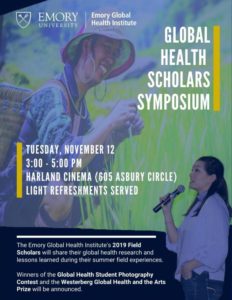
News, updates, and information for current students and alumni of the Department of Epidemiology at Rollins School of Public Health
Category : GLEPI Student Opportunities
The Emory Global Health Institute’s 2019 Field Scholars will share their global health research and lessons learned during their summer field experiences. 
Category : Student Opportunities
Title: Communications Associate – The Confounder
Organization: Epidemiology Department, Rollins School of Public Health, Emory University
Schedule: 5-10hrs/week, temporary
Location: RSPH Epi Department or remote
Description:
The Epidemiology Department at Emory University’s Rollins School of Public Health is seeking a motivated and independent Communications Associate with specific expertise in blog management, content curation, and email marketing.
The Epidemiology Department’s web presence (https://scholarblogs.emory.edu/epi/) and email newsletter (The Weekly Confounder) represent the voice and brand of the department. Key characteristics of the overall brand include:
– Community
– Collegiality
– Academic rigor
– Integrity
– Ambition
The position will require the student to format and post content on the Confounder site as they are emailed to them and collated throughout the week. The associate will schedule weekly emails to be sent to the department and alumni and work with the rest of the Epidemiology communications team to fulfill the mission and strategic goals of the department. This task may include independent search and identification of relevant content for the Confounder – including, but not limited to, events, jobs, and human interest content from outside sources. A successful candidate would be able to identify, troubleshoot, and report technical issues with WordPress and Mailchimp to the appropriate team members as needed. This role may require communication with alumni via email for job postings and events. Other job duties may include recruiting individuals for #IamEmoryEPI highlights and collaborating with the communications team to generate creative solutions to execute the Epidemiology departments communications goals.
Requirements:
– 1st year student in Epidemiology MPH program
– Strong writing/editing skills and attention to detail
– Experience with WordPress and/or Mailchimp preferred
– Available in-person for bi-weekly team meetings on campus
– Responsive to email and collaborative mentality
– Work hours are typically inconsistent (20 minutes here and there), and may include Saturdays and Sundays
How to apply: Please email your resume and a brief description of your relevant experience and interest in the position to duncan [dot] mahood [at] emory [dot] edu before November 11th.
Category : Student Opportunities
The Office of Career Development is pleased to host our 14th annual Outstanding APE Award recognizing RSPH students who best demonstrate excellence in practice-based public health practicums with goals to improve the quality of health for people & communities, to deliver quality public health services, or to develop policies that improve public health infrastructure. Finalists will be notified by mid-December and winners announced at the Public Health in Action Celebration (PHIA) Spring 2020.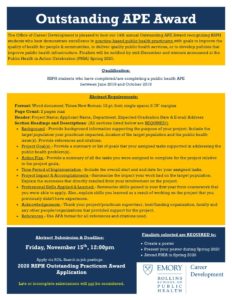
Category : Student Opportunities
Emory 21 Days of Peace is an initiative Emory Institute for Developing Nations (IDN), in partnership with Emory Campus Life, in collaboration with The Carter Center Human Rights Program and the United States Institute of Peace—was inspired to expand on the one-day International Day of Peace by developing a campaign titled “Emory 21 Days of Peace.” This year marks the 4th annual campaign. In the hopes of affirming positive peace as an alternative to the seemingly ubiquitous violence around the world, the goal of Emory 21 Days of Peace is to educate, inspire, and empower students with tangible skills to work for peace both in their local and global communities.
This year, Emory 21 Days of Peace is partnering with The OpEd Project, an organization which has an excellent track record of partnering with universities across the US, helping them channel their best ideas to media gatekeepers, and disseminate these ideas to the broadest audiences. As part of the tangible skills for peacebuilding, Emory students will have the opportunity to participate in a day-long “Write To Change The World” seminar which is designed to test assumptions about our individual knowledge, and what it takes to be influential on a large scale. Participants will explore the source of credibility; the patterns and elements of persuasion; the difference between being “right” and being effective; how to preach beyond the choir; and how to think bigger about knowledge—to have more impact in the world. Participants emerge with concrete results, including the outline for an OpEd. Participants will also have ongoing access to The OpEd Project national network of high-level Mentor-Editors, for individual feedback on their work.
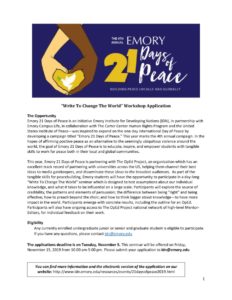
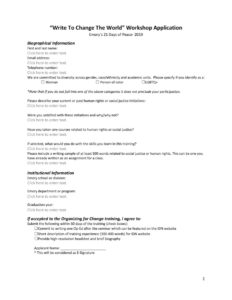
Category : Student Opportunities
Description
The Georgia Department of Public Health is the lead agency entrusted by the people of the state of Georgia with the ultimate responsibility for the health of communities and the entire population.
The agency is seeking one highly qualified candidates for the position of Professional Healthcare Worker within the Epidemiology Section/Office.
The incumbents will be employed for approximately 15-20 hours per week. The pay will be $14 an hour. The schedule is flexible, but the employees must conduct interviews, enter data, and perform other activities at the Department of Public Health offices in downtown Atlanta during normal business hours for more than half of the total weekly work time. Additional interviews and duties can be conducted during weeknight and weekend hours. This job can potentially include more hours during the summer and holiday breaks.
Job Responsibilities
The Georgia Department of Public Health is looking for a current MPH students or an incoming MPH-seeking students to assist in patient interviewing, data entry, data collection, data management, medical chart reviews, and other clerical work. This position include calling cases and controls to conduct interviews related to communicable disease surveillance, special studies, and outbreaks. Data entry and management responsibilities will include using various databases, such as Excel, Access, and the Georgia electronic notifiable disease system. Although the person filling this position will have the opportunity to learn about notifiable disease surveillance in general, the focus will be following up on reportable enteric disease cases and invasive bacterial disease surveillance conducted by the Emerging Infections Program.
This position could fulfill MPH practicum requirements. As part of a practicum experience, the student will:
1. Gain an understanding of how notifiable disease surveillance functions.
2. Understand how outbreak investigations are conducted.
3. Have an opportunity to analyze notifiable disease surveillance, study, and/or outbreak data.
This position are temporary and intended for students enrolled in an accredited public health degree program as the intention of the job duties is to provide applied public health knowledge and skills. This position is also limited to 2 years contingent on availability of funds.
Minimum Qualifications
Bachelor’s degree and one year of work related experience
OR
Four years of work related experience at an executive level
Preferred Qualifications:
Students seeking Master in Public Health or related degree from an accredited degree program
Experience working with databases
Experience conducting interviews
Spanish-speaking
To apply, click HERE.
Category : Student Opportunities
We are now recruiting 26 PhD students for our NWA project – Preparing for vector-borne virus outbreaks in a changing world – a One Health approach.
Preparing for vector-borne virus outbreaks in a changing world: an One Health Approach
The Netherlands, with its dense population of humans and livestock, international transport and travel hubs, and water-dominated landscape is particularly vulnerable to infectious disease outbreaks. The One Health Consortium aims to understand if and how changes in climate, farming, water management and travel lead to mosquito-borne disease outbreaks, to be better prepared.
Interacting changes
Infectious disease outbreaks are increasingly common due to multiple, interacting global changes and developments in the human, animal or environment domains.
These changes can trigger processes that disturb the fragile balance in the complex human-animal-environment ecosystem, up to the point where the conditions are created for (new) infectious disease outbreaks, in animals and/or humans. In these situations, the state of the system has reached a pathogen-specific vulnerability threshold ( ‘tipping point’), making the system receptive to outbreaks of that pathogen if it is introduced. The Netherlands, with its dense population of humans and food animals, international transport and travel hubs (Schiphol, Rotterdam), and unique water-dominated landscape is particularly vulnerable to the occurrence of such tipping points and hence, outbreaks of (newly emerging) infectious diseases. In this project we will consider four change scenarios that could lead to the occurrence of such tipping points and disease emergence:
changes in the climate,
changes in water management,
changes in farming methods and
changes concerning international travel and import risks.
Despite this expected vulnerability, emerging disease outbreaks in the Netherlands are still relatively rare. We currently study these outbreaks – when they occur – reactively, individually and within relatively isolated silos (e.g., human vs animal vs ecological health, academic research vs public health research, public vs private sector). This ad-hoc, reactive and fragmented approach is ineffective and inefficient. Instead, the partners collaborating in this project will adopt a pro-active, integrated, multisectoral, One Health approach in studying emerging infectious disease outbreaks.
We will develop and implement a forward-looking integrated research agenda, measuring and modelling how projected demographic, climatological, ecological, and planological changes will impact the risk of emergence of infectious diseases in the Netherlands, and translate this understanding into effective, integrated outbreak preparedness and response actions.
Focus on vector-borne diseases (VBD)
To prevent spreading our efforts and resources too thinly, we will focus our research agenda on a specific category of infectious diseases, namely vector-borne diseases (VBD), which are particularly relevant to the Netherlands, due to its water-dominated ecosystems and abundant wildlife as potential amplifying hosts. VBD are infectious diseases that are transmitted through arthropods (e.g. mosquitoes). They have been expanding massively in (sub)tropical regions of the world through trade and habitat changes.
Scientific and societal breakthroughs we aim to achieve
Our ambition is to prepare for VBD outbreaks in a rapidly changing environment. The One Health Consortium will do this by
providing pathogen specific and generic early warning indicators that measure whether our human-livestock-wildlife ecosystem is (becoming) vulnerable for VBD outbreaks,
developing novel catch all tools for outbreak detection and risk assessment,
translating the knowledge into interventions based on in depth knowledge of the entire ecosystem and interactions in which such outbreaks may occur.
Our approach consists of four complementary, interacting pillars. The One Health Consortium will gain a deep understanding of suitability of ecosystems in the Netherlands for VBD introduction, circulation, and expansion, and – conversely – the actionable factors that determine ecosystem resilience.
Pillar A: Ecosystem mapping
PhDs will be involved in studies aimed at mapping at high-resolution the complex interplay between factors that drive arbovirus introduction, circulation and expansion in the Netherlands. They will be involved in a series of uniquely interconnected research studies addressing reservoir hosts, disease hosts, viruses, vectors, and their interactions, and through their work provide critical baseline data for the PhDs in pillar B, responsible for model development.
Wild-animals are important as reservoir for arboviruses, both by introducing viruses through migration, and by serving as amplifiers of locally present viruses, if conditions are favourable. In addition, specific vectors are needed for arbovirus establishment. The group of PhDs involved in this work will jointly design smart surveillance strategies, involving well-trained citizen scientists coordinated by Vogeltrekstation, as well as studies in dead birds and other wild-life reported to the Dutch Wildlife Health Centre. Where needed, this will be complemented with targeted sampling of rodents, bats, and wild herbivores to provide information regarding circulation of (emerging) arboviruses. Dried blood spot samples, throat- and cloacal swabs will be tested for antibodies and/or target viruses, using protein microarrays and multiplex PCRs, developed as part of this project (Pillar D).
Analytical methods will be harmonized across species, including humans. Spatial and temporal avian host dynamics will be studied through citizen-science projects combined with detailed longitudinal studies in selected host species and in relation to virus exposure. We will gather data on density and movements of competent avian hosts for (invasive) mosquito vectors for animal and human AVD by combining and modifying existing citizen science projects (Sovon, Vogeltrekstation, Eurobirdportal, Trektellen) to monitor avian host occurrence in time and space. For rodents, bats and mammals, data will be gathered through “Waarneming.nl” and the Network Ecological Monitoring of CBS and through direct consultation of landowners that use large grazers as management tool.
If an actual VBD outbreak occurs in the Netherlands during the project period, the efforts and associated resources will be realigned to target the specific disease, if agreed with the funder and in collaboration with co-financing partners with a mandate for outbreak response. Sanquin and the blood bank of Curacao will prepare a rapid response protocol for population exposure testing during a health threat, and will provide access for establishing baselines for systems serology studies. To do this, joint preparedness protocols will be developed under coordination of PhD project 21.
PhD projects 1 through 5 are tightly linked and will collaborate closely to optimise sampling of various taxa and to allow for cross-taxa analyses and integration of data from virus phylogeny and pathogenicity to vector and host population dynamics and, ultimately, risk mapping and early warning.
PhD vacancies
PhD position 1: Citizen science for mosquito surveillance
PhD position 2: Wildlife surveillance
PhD position 3: Impact of emerging arboviruses on wild bird populations
PhD position 4: Tracking of movement, density and mortality of susceptible amplifying hosts (birds, rodents, bats, mammals)
PhD position 5: Dynamic risk based early warning risk maps
PhD position 6: Travelers as sentinel and source of arboviruses
PhD position 7: Citizens and surveillance with focus on high schools
PhD position 8: Arbovirus impact in livestock
Pillar B: Forecasting and early detection
PhDs will be involved in studies aimed at mapping the complex interplay between factors at high-resolution that drive arbovirus introduction, circulation and expansion in the Netherlands. They will be involved in a series of uniquely interconnected research studies addressing reservoir hosts, disease hosts, viruses, vectors, and their interactions, building from field and experimental data (collected in Pillars A and D), supplemented with data relevant to model VBD life-cycles collected from public sources (e.g., KNMI, CBS, literature, data from the EDEN/EDENext EU-funded projects). We will develop a method and practical tools for early warning to quantify and predict when the critical emergence threshold will be reached for VBD. The model-based approach will be used to analyse scenarios that could lead to disease emergence: 1) changes in climate, 2) changes in water management, 3) changes in farming practices, and 4) changes in importation risk. Critical knowledge gaps for the change scenario’s will be addressed through targeted experimental studies that generate essential data for the scenario modelling.
PhD vacancies
PhD position 9: Tracing and retracing mosquito-borne disease emergence
PhD position 10: Tools to explore risk of emergence of vector-borne diseases in ecosystems
PhD position 11: Generic early warning indicators for vector-borne infections
PhD position 12: Predictors of tipping points of mosquito populations in a changing world
PhD position 13: Vector competence studies in change scenario’s
PhD position 14: Vector immunity in change scenario’s
PhD position 15: Experimental work on effects of global change scenarios on vector population parameters
Pillar C: Impact and severity assessment
In Pillar C we address key knowledge gaps that are crucial to model the potential impact of an outbreak through a suite of in vitro and in vivoexperiments in mosquitoes and (reservoir and disease) hosts, respectively. The work in pillar c will address a select group of critical parameters to answer key questions for risk assessment: 1) what vector and vertebrate species can be infected, 2) can the virus efficiently spread between vectors, animals and humans, and 3) can the virus cause (severe) disease in animals or humans?
PhD vacancies
PhD position 16: Prediction of host range and reservoir potential
PhD position 17: Understanding the role of vector, host and virus variations in transmission and disease
PhD position 18: Models to study and prioritize neuropathogenic arboviruses
PhD position 19: Role of host innate immune responses and arbovirus innate immune evasion in transmissibility, host range and disease outcome
PhD position 20: Arbovirus systems serology: antibody profiling for exposure and impact assessment
Pillar D: Interventions
The findings from the studies in pillars a, b, and c will be used to guide development of targeted early warning systems and tools for rapid assessment of risk of emerging VBD to humans and animals, to be transferred to institutes with primary responsibility for early warning.
A cross-cutting toolkit of advanced assays will be developed, including targeted and metagenomic NGS, protein microarrays, eDNA metabarcoding, targeted to field studies and for rapid outbreak response. To allow deployment for use in regions with limited research infrastructure, such as the Dutch Caribbean, fieldable versions of the key assays will be developed. A suite of bio-informatic tools, coupled with a data sharing and analysis platform will be developed for the entire project in collaboration with the European data infrastructure EBI/ELIXIR and the COMPARE project.
PhD vacancies
PhD position 21: From theory to practice: what to do, when and where?
PhD position 22: Serological tools for surveillance across species
PhD position 23: Pathogen detection, metagenomics and genomic epidemiology for early warning surveillance
PhD position 24: Modulating mosquito immunity
PhD position 25: Arbovirus pathogenesis and development of innovative vaccine candidates
PhD position 26: Universal vaccines
Partners in this project: Erasmus Medical Center, Utrecht University, Wageningen University Research, Leiden University Medical Center, Radboud University Medical Center, NIOO, Avans Hogescholen, Leiden University, Utrecht University Medical Center, Deltares, RIVM, KNMI, Red Cross Blood bank foundation, Sanquin, Techncasium, NVWA, CEAB-CSIC (Spain), SOVON
For more information, click HERE.
Category : Student Opportunities
R4epis is a project to develop standardised data cleaning, analysis and reporting tools to cover common types of outbreaks and population-based surveys that would be conducted in an MSF emergency response setting.
This has been done through the development of the package sitrep in R software. The package provides field epidemiologists with novel data management tools as well as templates of automated “situation reports” that cover outbreak investigations (acute jaundice syndrome, cholera, measles, meningitis) and three of the MSF ERB pre-approved surveys (mortality, nutrition and vaccination).
All of the report templates are contained within the sitrep package as RMarkdown templates that can easily be used from within RStudio. The user then modifies a template to his/her needs.
The templates address all aspects of:
All of the code is open source and freely available and can be used by anyone. For suggestions on what to add or change, please open an issue on GitHub. or contact one of our contributors.
For more information, click HERE.
Category : Student Opportunities
Covidence is a powerful tool designed to streamline production of high-quality evidence reviews. Working with your academic library, guide your team through the rigorous processes involved in a review.
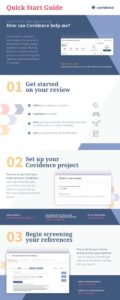
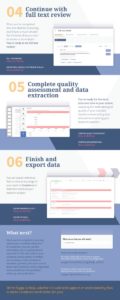
Category : GLEPI Student Opportunities
Thomas Jefferson University has offered industry-sponsored Fellowships in health economics and outcomes research (HEOR) since 1994. The Fellowships are administered through the Jefferson College of Population Health (JCPH), which is the nation’s first college of population health. During this webinar, current Fellows from Celgene, Ethicon, Novartis and Teva will discuss the Fellowship, the application process and their experiences as Fellows. The event will be livestreamed and recorded for future viewings. Participants are encouraged to ask questions at the end of the presentation. Please register using the following links:
For more information,
Email JCPHFellowship [at] Jefferson [dot] edu
Or go to Jefferson.edu/HEORFellowships
Category : GLEPI Student Opportunities
Position Title: Digital Slide Archival Assistant Intern
Location: CDC, Roybal Campus, 1600 Clifton Road, NE, Atlanta, GA 30329
Start Date: November 1, 2019 – May 31, 2020 (estimated)
Duration: Up to 180 calendar days (up to one year if earning academic credit)
Hours: A minimum of 10 hours per week (flexible, based on schedule) This is an unpaid internship. Applicants must be current students.
This position is located in the National Center for Emerging and Zoonotic Infectious Diseases (NCEZID), Division of High Consequence Pathogens & Pathology (DHCPP), Infectious Disease Pathology Branch (IDPB).
Education Requirements:
Interest in biology and/or life science preferred, but not required
Description: IDPB has a large collection of digitized glass slides from interesting cases of infectious disease that need careful sorting and organization for long-term archival and access through database software. A laboratory assistant is needed to organize the files, name the files appropriately, and sort and upload files into database software (eSlide Manager).
Duties:
• Become familiar with digital slides, the archival system, and eSlide Manager database software (training will be provided)
• Rename files, sort files, and upload pertinent clinical information
• Work with the ePathology unit of IDPB to ensure archival system meets branch needs
• Must be detail-oriented with excellent communication skills
Requirements:
• Good organizational skills
• Attention to detail when working with numbers, including lists
• Good oral and written communication skills
• Adherence to laboratory safety practices
• Ability to work in a fast-paced, highly time-sensitive environment, while ensuring high quality and efficiency
• Ability to work well independently and as part of a team
• Ability to establish and maintain effective working relationships with other professionals within CDC and with external organizations
• Ability to manage multiple projects with varying tasking, short turnaround times, and meet or exceed all deadlines
• Ability to prioritize work
• Must possess excellent oral and written communication skills
• Ability to efficiently use Microsoft Office programs (Word, Excel, PowerPoint, Outlook, Access), and SharePoint
• Demonstrates initiative on assignments and projects, and proactively tackles responsibilities
• Ability to produce accurate documents and materials with little or no supervision
Work Hours:
Students must be able to work at least 10 hours a week in the CDC Office. The work schedule for this position
is flexible and will be discussed and approved by both parties.
Applications:
Submit resumes via email to the CDC Human Resources Customer Service Helpdesk at HRCS [at] cdc [dot] gov with the subject “SWEP Student Volunteer Program – Digital Slide Archival Assistant Intern” no later than 4 p.m., Monday, October 14, 2019. Students selected for interviews will be contacted, and the student(s) selected for participation will be required to complete additional paperwork.
Recent Comments